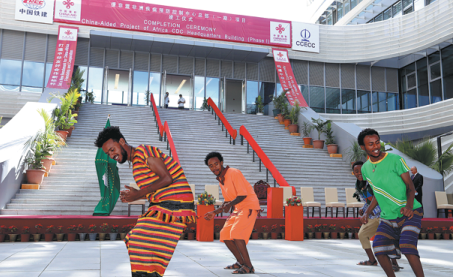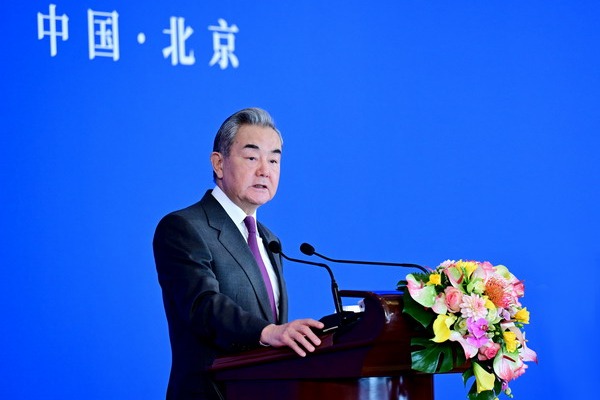Belt and Road bearing fruit across Africa

From expressways to agricultural exports, initiative spurring growth, improving lives

A range of projects under the Belt and Road Initiative — from an electric light-rail line in Nigeria and a pharmaceutical warehouse in Zimbabwe, to an expressway in Kenya and a fruit-export program in Tanzania — are improving people's livelihoods across Africa and helping countries there realize sustainable development.
In Nigeria, the first phase of the Blue Line of the Lagos Rail Mass Transit project, the first electric-powered light rail in West Africa, is expected to greatly reduce traffic congestion in the state of Lagos and make travel much easier.
Completed in December and expected to be commissioned later this month, the 13-km section of the 27-kilometer Blue Line was built by China Civil Engineering Construction Corp. The section consists of five stations and is expected to carry about 250,000 passengers daily when it begins operations.
Another BRI project completed in Nigeria in the past year was the Lekki Deep Sea Port at the heart of the Lagos Free Zone.
The port, designed to handle 2.7 million Twenty-foot Equivalent Units of cargo annually, is expected to start commercial operations later this month. It will be one of the most modern ports in West Africa and is expected to greatly ease the bottleneck in international trade for Africa's largest economy.
The port is expected to create nearly 170,000 jobs and generate revenue of $361 billion over the next 45 years.
In Kenya, Kiprogei Murrey, a taxi driver in the capital, Nairobi, once dealt daily with traffic congestion on the main road from Jomo Kenyatta International Airport to the city center. He frequently spent more than an hour-and-a-half to complete the 20-km journey during the evening rush hour.
The situation suddenly changed in July, with the opening of the country's first toll expressway, which links the airport with the central business district. The 27-km, six-lane expressway cuts the journey to just 15 minutes.
"The expressway is very convenient," Murrey said. "It saves us a lot of time and fuel, which is becoming much more expensive."
The expressway, financed and built by China, has been warmly welcomed by local residents. Since it officially started operations at the end of July, the number of vehicles using the road has continued to increase.
By late December, an average of 50,000 cars were commuting on the road each day, an increase of nearly 400 percent compared with the initial period of operation, according to its operator.
In Zimbabwe, a $22 million pharmaceutical warehouse, funded and built by the Chinese government, was commissioned in April. The facility has boosted the country's medicine storage capacity as well as improved its health system.
Nicholas Tonderayi, a resident of Harare, Zimbabwe's capital, said that the warehouse, which is located at Sally Mugabe Central Hospital, the country's second-largest referral hospital, will help the country store medicines, thus improving the availability of drugs in the health centers.
"Previously, Zimbabwe had drug storage difficulties, which severely affected the country's health supplies delivery," he said.
By early December, 150 countries and 32 international organizations had joined the Belt and Road Initiative, with more than 200 cooperation agreements signed.
In Nairobi, Adhere Cavince, a scholar of international relations with a focus on China-Africa cooperation, said that most African countries have benefited from the BRI in various ways since the initiative was launched nearly a decade ago.
Under the BRI, Africa has seen comprehensive investment and infrastructure upgrades including ports, railways, roads, telecommunications and energy installations, he said.
While infrastructure construction remains the most visible component of the BRI, the initiative is supported by the four pillars of trade, policy coordination, financial inclusion and cultural exchanges, Cavince said.
President Xi Jinping has said that BRI cooperation aims to improve connectivity in infrastructure, such as roads, as well as trade, capital, policy and the promotion of people-to-people exchanges.
In addition to infrastructure development, the BRI saw increased exports of African agricultural products to China last year.
In August, Kenya exported 45 metric tons of avocados to China after the latter opened its market to fresh Kenyan fruit in March.
By October, Kenya had exported $57 million worth of avocados to China, according to the Kenya Export Promotion and Branding Agency.
Tanzania is also expected to start exporting avocados to China after the two countries signed a protocol on sanitary and phytosanitary — relating to plant health, especially regarding international trade — procedures in November.
According to a report by the World Bank, the BRI has the continuing potential to substantially improve trade, foreign investment and people's living conditions, and transportation projects carried out under the BRI can lift 7.6 million people out of extreme poverty.
Cavince, the Kenyan scholar, said: "The BRI is about more than the often discussed infrastructure construction. At its core, the initiative is emblematic of the socioeconomic transformation of China and the resulting goodwill that Beijing has extended to other developing nations. The BRI allows emerging economies to learn from China while tapping into the opportunities arising from China's decision to share the proceeds of its development with the rest of the world."
Zhang Yongpeng, a researcher of China-Africa relations at the Chinese Academy of Social Sciences, said the BRI, proposed by President Xi in 2013, is China's contribution to global peace and development.
In Africa, the initiative has been closely linked with the African Union's Agenda 2063, a blueprint to transform the continent into a global powerhouse of the future, as well as the development strategies of various African nations, thereby promoting the sustainable development of the whole of Africa, Zhang said.
"The rich fruits of China-Africa cooperation have proved that the BRI meets the demand of the international community and human development, and that it can bring benefits to the whole world," he added.
Paul Tembe, a senior lecturer and researcher at the University of South Africa's department of linguistics and modern languages, said that although the BRI was proposed by China, it has brought benefits to the world through infrastructure development and people-to-people understanding, as well as by promoting multilateralism and international solidarity.
"As the world faces the prospect of a retreat from globalization toward hyper-nationalism, it is prudent to reflect on the benefits of the Belt and Road Initiative," he said, calling the BRI "a game changer in international affairs, trade and financial relations, and the governance of multilateral institutions."
Wang Xiaodong in Nairobi contributed to this story.
edithmutethya@chinadaily.com.cn

































